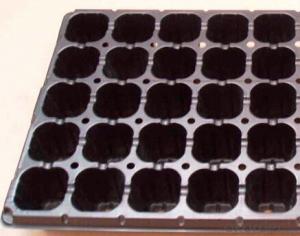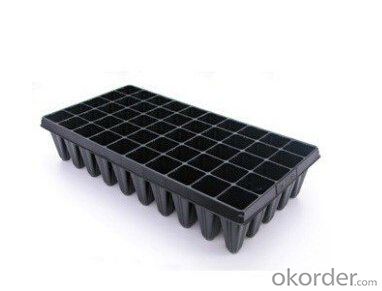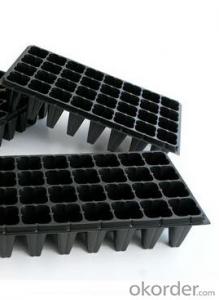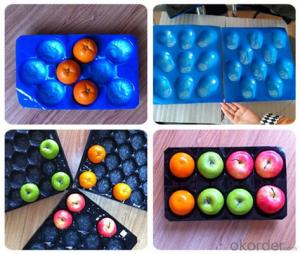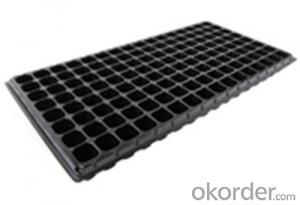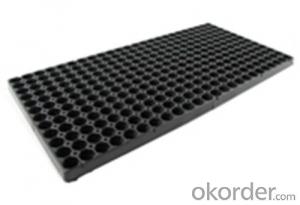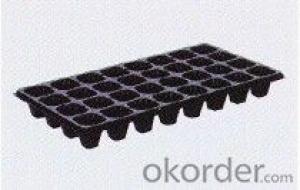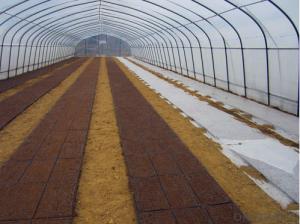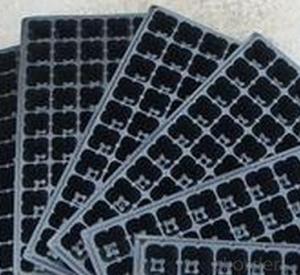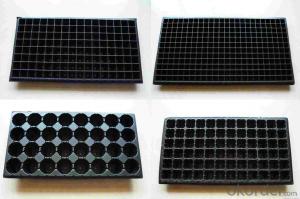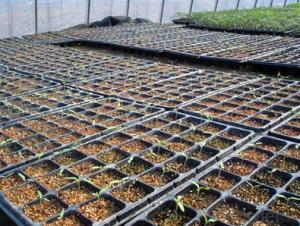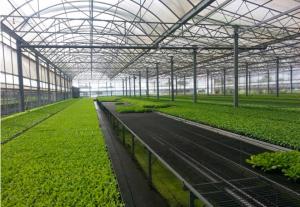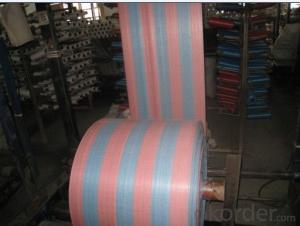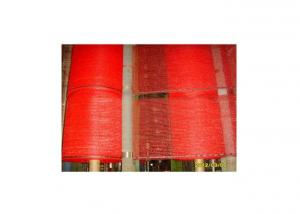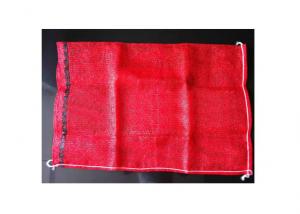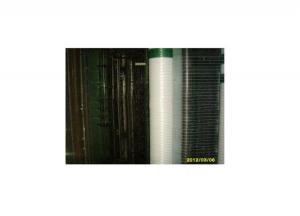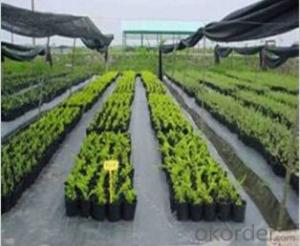Plastic Nursery Seedling Trays for Agriculture
- Loading Port:
- Ningbo
- Payment Terms:
- TT OR LC
- Min Order Qty:
- 10000 pc
- Supply Capability:
- 10000000 pc/month
OKorder Service Pledge
OKorder Financial Service
You Might Also Like
Product Description
PLASTIC SEEDING TRAY
---Cheap Factory Price
---Different Cells of Trays Available
---Good Intensity & Water Retention
---Can Customize The Tray As Your Request
ADVANTAGES OF OUR PLASTIC SEEDLING TRAY
1,Our seeding trays are with good intensity, strong enough and suitable for long distance transportation and mechanization of transplanting and they have good abilities of water retention.
2, If our seed tray don’t meet your request , we can also develop new mould for the seed tray you need .
3,Our seeding tray is high quality with competitive price ,and they are Eco-Friendly , Recyclable and Reuse.
4,Fast delivery : we can finish your order with in 10-20 days according to your order quantity .
- Various thickness
We can offer thickness from 0.6mm-1.9mm, helping maximize the potential of different usages- disposable and multiple use.
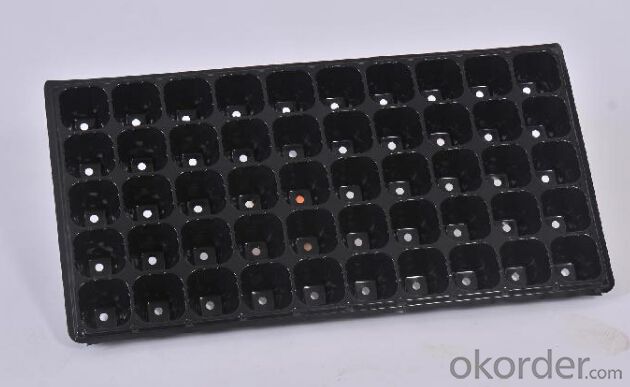
Specifications
Nursery Seedling Tray For Sale
1.for 10 years
2.size and color:black
3.protect vegetables nursery
FAQ:
Can it be customized?
We have quite different models of seeding trays, such as the 32 cells, 50 cells,72 cells, 98cells, 105 cells, 128 cells ,200 cells . And they are made of HIPS or PVC , being used extensively in horticulture field , like cultivating Propagating Vegetable , flowers and other plant from seed.
- Q: This question asks for a list of the most effective plastic products used in agriculture tailored for various types of crops.
- <p>The best agricultural plastic products for different crops include mulch films for weed control and moisture retention, drip irrigation systems for water efficiency, greenhouses for controlled growing environments, and row covers to protect crops from pests and harsh weather. For specific crops, like strawberries, plasticulture systems with raised beds and drip tape can be beneficial. For vine crops, trellises and support structures made from plastic are advantageous. For greenhouse crops, plasticulture techniques often involve the use of plastic pots and hydroponic systems. It's crucial to select the right plastic product based on the crop's specific needs and the local environmental conditions.</p>
- Q: How do I sterilize a nursery tray?
- To sterilize a nursery tray, you can start by washing it with warm soapy water to remove any dirt or debris. Then, rinse it thoroughly to ensure all the soap is removed. Next, you can soak the tray in a solution of bleach and water, using approximately 1 tablespoon of bleach per gallon of water. Allow the tray to sit in the solution for about 10 minutes. Afterward, rinse the tray again with clean water and let it air dry completely before using it for any nursery purposes.
- Q: Are agricultural plastic products used in organic integrated pest management methods?
- Yes, agricultural plastic products can be used in organic integrated pest management methods. However, it is important to note that organic farming practices generally prioritize the use of non-synthetic materials. While some organic farmers may choose to use agricultural plastic products like mulches or row covers to control pests, alternative methods such as crop rotation, biological controls, and habitat manipulation are typically preferred.
- Q: What are the different types of plastic covers used in agriculture?
- There are several types of plastic covers commonly used in agriculture, including greenhouse film covers, mulch film covers, and tunnel covers. Greenhouse film covers are usually made of polyethylene and are used to create a controlled environment for crops, protecting them from extreme weather conditions and pests. Mulch film covers are typically made of low-density polyethylene (LDPE) and are used to cover the soil surface around plants, conserving moisture, suppressing weed growth, and regulating soil temperature. Tunnel covers, on the other hand, are made of polyethylene or polyvinyl chloride (PVC) and are used to create temporary structures that protect crops from wind, frost, and excessive precipitation.
- Q: Can agricultural plastic products be used for crop storage?
- Yes, agricultural plastic products can be used for crop storage. These products, such as plastic bags, films, and containers, are commonly used in the agricultural industry for storing crops. They provide a protective barrier that helps to prevent spoilage, maintain product quality, and extend the shelf life of the harvested crops.
- Q: Where can I find information on recycling number 4 plastics in my area? The local recycling center does not accept it.
- There's a place in Pottstown called Recycling Services, Inc. that takes all numbers, except 7. They also take old electronics, glass, metal, styrofoam peanuts, and some yard sale items. They also sell items made from recycled things. Address: 365 Elm Street, Pottstown, PA 19465 They will ask for a $5 donation per car when you enter. Great place to take all your recycleables!
- Q: Can ground cover plants be used to prevent erosion?
- Yes, ground cover plants can be used to prevent erosion. They have extensive root systems that help anchor the soil, reducing the risk of erosion caused by wind or water. Additionally, ground cover plants help to slow down the flow of water, allowing it to infiltrate the soil rather than causing surface runoff. This helps to retain moisture in the soil and further prevent erosion.
- Q: What are the different types of plastic trays used in horticulture?
- There are several different types of plastic trays commonly used in horticulture, including seed trays, plug trays, cell trays, and propagation trays. Seed trays are shallow, flat trays used for germinating seeds. Plug trays have individual cells or compartments designed to hold seedlings or plugs. Cell trays have larger cells compared to plug trays and are used for growing larger plants. Propagation trays are used for rooting cuttings or propagating plants, typically with a bottom tray and a clear plastic dome to create a greenhouse-like environment.
- Q: How do you prevent ground cover from spreading too aggressively?
- One way to prevent ground cover from spreading too aggressively is by regularly trimming or pruning it. This helps to control its growth and keep it in check. Additionally, creating physical barriers such as edging or installing root barriers can help prevent its spread into unwanted areas. Lastly, regular monitoring and removing any new shoots or runners that appear beyond the desired boundaries can help prevent its aggressive spread.
- Q: Are nursery trays suitable for starting plants for rooftop gardens?
- Yes, nursery trays are suitable for starting plants for rooftop gardens. They provide a controlled environment for seedlings to germinate and grow, allowing for easy transplanting once they are ready. Nursery trays also help in organizing and conserving space on rooftops, making them an efficient option for starting plants in rooftop gardens.
Send your message to us
Plastic Nursery Seedling Trays for Agriculture
- Loading Port:
- Ningbo
- Payment Terms:
- TT OR LC
- Min Order Qty:
- 10000 pc
- Supply Capability:
- 10000000 pc/month
OKorder Service Pledge
OKorder Financial Service
Similar products
Hot products
Hot Searches
Related keywords
